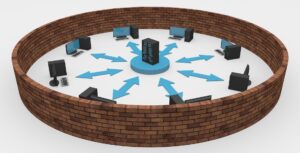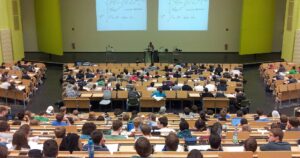
The Future of Work Panels: Questions and Overview
Pam Sornson, JD
November 21, 2023
Many topics were discussed at the recent Future of Work Conference hosted by Pasadena City College’s Economic and Workforce Development division (PCC EWD) on October 26th. Speakers, panelists, and audience members all contributed unique and relevant inputs to the broader conversation, adding color and nuance based on their particular EWD sector and expertise. A short synopsis of the questions posed to them all – and the questions some of them asked in response – may help Pulse readers make more sense of the two Panel dialogues that will be presented in our December 5th edition.

Three Overarching Conference Considerations
There were three primary considerations proposed as the foundation of the day’s conversations:
How can we better align the goals and systems of California’s three major EWD elements: state-based workforce development programs, community college career technical education courses (CCC CTE), and trade union participation?
How do we adapt the California community college academic system’s best-in-class student success innovations to better meet learner and employer needs?
How can we best align our CCC efforts with national and State priorities, including enhanced union engagement, to connect industry sector priorities to growing and emerging economic opportunities?
These are not insignificant issues. The fallout from the COVID-19 pandemic and its ancillary industrial and social upsets has roiled the traditional way of doing business. The panelists, speakers, and audience members were eager to share their views on how those developments have impacted the way they do their work.

Two Panels. Many Perspectives.
The day’s two panels focused on related but different aspects of the EWD environment. The first one focused on transforming educational pathways to occupations and careers. The second Panel focused on modifying student success systems to reflect the influx of desperately needed system change. Each panelist was then asked to respond to specific questions within each topic to elicit their particular perspective on those issues. The aggregation of opinions and expertise provided an excellent overview for audience members of the many facets involved in addressing these pressing EWD concerns.

Panel One: Training, Trades, and the Transformation of Pathways
Panelists on the first chat of the day represented three major EWD subsectors:
Government: Pasadena Mayor Victor Gordo, whose focus for his 20+ years in leadership has been to promote safe, family-friendly environments throughout [LA].
Unions: Ernesto Medrano, a construction trade union chief who currently holds the role of Executive Secretary, Los Angeles/Orange Counties Building and Construction Trades Council, and
Service Agencies: Kelly LoBianco, the inaugural director of LA County’s newly formed Department of Economic Opportunity.
Their responses to questions asked by Moderator PCC Interim President/Superintendent Dr. Jose Gomez reflect the views they’ve developed based on their unique histories and careers and on the roles they currently hold within their sector. The takeaways from the conversation enlightened the audience about how these three systems are working together to repair organizational damage while reinventing elements that disappeared.
What are the biggest influences on the building trades these days?
How can we build an equitable workforce while rebuilding the economic infrastructure?
How can we best manage the EWD investments directed at each of your agencies?
The commentary by the panelists stimulated equally interesting questions from the audience:
How can small businesses connect with these development opportunities?
Is there training available for the administration jobs that industries are generating?
What opportunities are available for former prison inmates?
Are funds and support systems in the works for the families caring for these workers, especially for child care?
The queries and responses presented by both panelists and audience members provided insights into individual elements of the EWD sector as well as raised further questions for future discussion.

Panel Two: Innovation in Driving Student-Focused Systems Change
The second Panel was equally informative, as it focused the conference’s attention on community colleges and the success of their students. These four experts represented distinct elements of the EWD sector: government, business, communications, and (of course) education.
Government: Kelly Mackey, State Director of Strategic Apprenticeships, State of California Apprenticeship and Workforce Innovation Unit, CA Department of Industrial Relations
Industry: Dennis Rodriguez, Director of Business Development, Black & Veatch, a construction corporation focused on infrastructure resources, including power and water utilities.
Communications: Nicole Feenstra, Director – The DNA Agency, a messaging and marketing agency engaging directly with the residential construction industry.
Education: Dr. Francisco Rodriguez, Chancellor, Los Angeles Community College District, which includes nine California Community Colleges in the LA County region.
In addition to the overarching ‘student success’ inquiry for this Panel, they were each asked to offer their thoughts on several ancillary topics, as well:
How will technology impact student success?
How do we create a culture of collaboration within your agency?
What is the State doing about diversity within career pathways?
How are industries bridging the worker/workforce supply/demand gap?
How do we recruit potential workers to industry-focused programs?
How can we collect the feedback we need to clarify our processes and achieve our goals?
And, again, members of the audience had their own concerns to raise:
Are we teaching soft skills as well as technical capacities?
Are we including older workers in evolving EWD systems?
What are we doing to reach into communities to find those who want access to these resources?
The substance of these conversations was wide-ranging and comprehensive. They will be featured in the next edition of the Pulse.
Overall, it was an energetic, informative, and community-building kind of day, where all participants – keynote, panelists, and audience members – gave their particularly relevant contributions to the broader conversation. Clearly, the residents of Pasadena, the Los Angeles region, and California in general are very well served when it comes to addressing pressing workforce challenges to create the economic foundation of the future.


